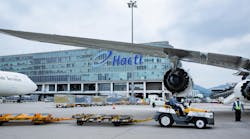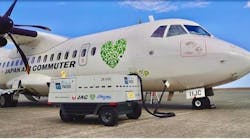SATS Ltd, a global provider of ground handling, air cargo and Asia’s provider of food solutions, has embarked on a comprehensive collaboration with UOB, to support sustainability efforts throughout its supply chain, with its supplier engagement program aimed at small-medium enterprises (SMEs) in Singapore.
The first of multiple planned initiatives in this collaboration, the SATS x UOB Electric Mobility Workshop conducted recently focused on introducing SATS’ critical and strategic suppliers to the value of transitioning to commercial electric vehicles (EVs) for their businesses.
Suppliers of SATS’ learned about the enablers for transition to EVs such as financial factors like costs and incentives; vehicle attributes like driving range, battery performance, charging duration, safety, maintenance, and disposal requirements; and availability and access to charging infrastructure.
These suppliers viewed and test drove the commercial EVs distributed by Hong Seh Evolution.
“As a responsible steward, it is our duty to support our suppliers in their decarbonisation journeys and provide them with the means of operating in a more sustainable manner,” says Tan Yen Ling, head of group sustainability, SATS. “Our suppliers adopting decarbonisation solutions also contributes to SATS’ objectives of minimising the environmental impact of our supply chain.”
Ernest Tan, head of consumer goods, sector solutions group, UOB, said, “Collaborations are powerful catalysts in accelerating sustainability adoption amongst businesses. Our deep understanding of SMEs enables us to simplify sustainable financing for SATS’ suppliers through our programmes such as U-Drive and U-Solar, while providing support for sustainability ratings. We believe this collaboration with SATS is a win-win for like-minded large organisations and their SME ecosystems in meeting our collective net zero goals.”
As an extension to the supplier engagement program, SATS collaborated with UOB to bring together SATS’ suppliers, primarily the SMEs, and UOB’s ecosystem of sustainability solution providers to introduce them to various opportunities to decarbonise their operations.
SATS’ approach to reducing carbon emissions and transitioning towards green energy use focuses on electrification, solarisation and energy optimisation. Leading by example, SATS has recently attained the LowCarbonSG logo, while encouraging its suppliers to pledge and join the programme as well. LowCarbonSG is a capability-building programme which enables local businesses in Singapore to start monitoring and where possible, reduce their carbon emissions.



